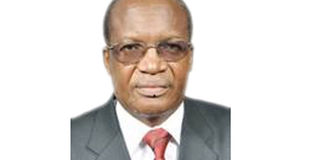Even historians cannot undo what military did to Mugabe

Mr Baligidde is a former diplomat, lectures at Uganda Martyrs University-Nkozi.
What you need to know:
- Uncle Bob shouldn’t escalate nostalgia for the past, lest he be perceived as a grumpy old man. As Abraham Lincoln once said “the dogmas of the quiet past are inadequate for the stormy present”.
- Coincidentally, the statement by a British prime minister about “the winds of change blowing over Africa” signaling Britain’s imminent granting of independence to its colonies was made in South Africa!
- Since the initial conditions of complex systems cannot be perfectly ascertained, political change too cannot be accurately predicted because slight errors in measuring the condition of a country’s politics are often exaggerated through the use of wrong or inadequate descriptors rendering diagnosis inaccurate and prediction meaningless.
One Samuel Butler blasphemed when he impugned God could not alter the past, but historians could, and that it was because they can be useful to Him in altering it that He tolerates their existence. Yet even historians cannot undo what the Zimbabwean military leadership did to their commander-in-chief.
How could Dr Robert Mugabe have made such a terrible mistake of ignoring Niccolò Machiavelli’s book, The Prince, for guidance? The Florentine Nobleman wrote that a Prince was obliged to imitate the fox and the lion, for it cannot protect itself from traps, and the fox cannot defend himself from wolves; one has to be a fox to recognise traps, and a lion to frighten wolves. The Prince must have a mind disposed to adapting to the wind and as the variations of fortune dictate, not to deviate from what is good, but be able to do evil if necessary, Machiavelli counselled.
Uncle Bob shouldn’t escalate nostalgia for the past, lest he be perceived as a grumpy old man. As Abraham Lincoln once said “the dogmas of the quiet past are inadequate for the stormy present”. Mugabe was not the first to be thus humiliated. Dr Milton Obote ignored a colonial Governor’s advice to discharge Sergeant-Major Idi Amin from the Army when he allegedly exhibited brutality, but Obote promoted him instead!
Amin had no qualms later overthrowing his mentor in what renown military studies specialist Samuel Decalo described as a ‘personalist coup’ that didn’t stem from the Uganda Army’s historic volatility, societal tensions permeating into the officer corps hierarchy or Amin’s dislike of Obote’s paramilitary forces, which he used to perpetuate his tenure, but Amin’s animal instincts for survival and when he outlived his usefulness, tried to dispose of him.
By contrast, what prompted military intervention in Zimbabwe was military anomie and political entropy; not disrespect to Zimbabwe’s liberation war hero. They reflected not the social and organisational characteristics of shall we say the inglorious or glorious past military history of Zimbabwe, but the political and institutional structure of society in Zimbabwe as well as the need for democratic best practices. Given his contribution to the African liberation struggle, Mugabe would have remained the undisputed hero if he had not behaved like the old-fashioned individual who goes his own way and suffers for it later.
Autogolpes, where the State ostensibly overthrows itself [to improve its democratic approval ratings, entrench itself or get rid of corrupt and self-seeking individuals perceived a liability], are attributable to the military’s uniqueness, professionalism, nationalism, cohesion and austerity, which underpinned the military’s move and relative armed forces’ passivism in South Africa. Military intervention is a function of chronic systemic disequilibrium.
The dimensions and tipping points in Zimbabwe, South Africa and Ethiopia are fundamentally incongruent to those in Uganda where since 1986 military-civilian rapport until recently, had been good. Rest assured though that the seemingly contextual similarities between Zimbabwe and South Africa that have re-invigorated wishful thinking about chain reactions may not be replicable.
Coincidentally, the statement by a British prime minister about “the winds of change blowing over Africa” signaling Britain’s imminent granting of independence to its colonies was made in South Africa! The application of Edward Lorenz’s and Mary Cartwright’s generic ideas about Chaos Theory’s strange attractor notion dubbed ‘butterfly effect’ to Public Affairs leads to the conclusion that until otherwise proven, a contagion of the Southern African example may not be perpetually inconceivable.
Since the initial conditions of complex systems cannot be perfectly ascertained, political change too cannot be accurately predicted because slight errors in measuring the condition of a country’s politics are often exaggerated through the use of wrong or inadequate descriptors rendering diagnosis inaccurate and prediction meaningless. Beyond politics, Uganda’s intractable problems stem from chronic historic imbalances resulting from the unequal socioeconomic development of its ethnic and geographical components.
Mr Baligidde is a former diplomat, lectures at Uganda Martyrs University-Nkozi.




